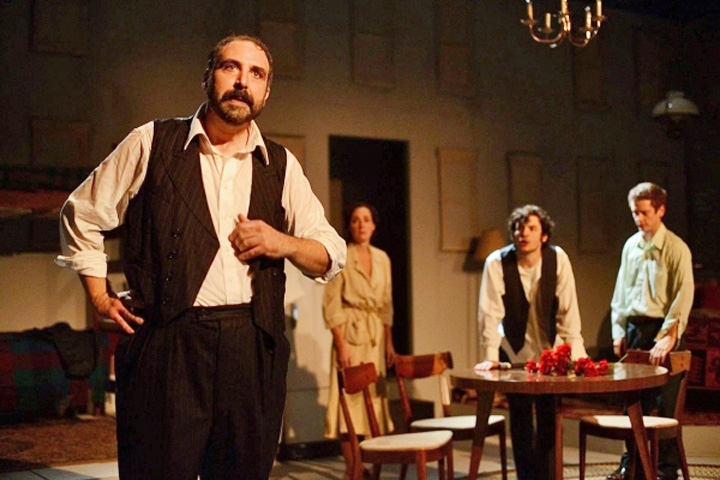
Death of a Salesman. By Arthur Miller. Lane Savadove directed. EgoPo Classic Theater, 2015.
When a small theater company does Death of a Salesman, you can’t expect it to present a superstar in the lead role. Instead, you hope to see a fresh approach in its staging.
The adventurous EgoPo provided just that by looking at Arthur Miller’s family background and supposing, or imagining, that he had not made a conscious effort in 1949 to suppress his Jewish identity. As written during America’s melting-pot era, the Loman family has no specific religion or ethnicity. Director Lane Savadove adds a prologue in which mourners gather in the Loman home to comfort Willie’s widow and hear a rabbi recite the Kaddish.
Miller grew up in an immigrant Jewish family, and in his autobiography he wrote that he based Salesman on his kin. Therefore it’s enlightening to see this interpretation as a fresh alternative view of a classic. The story is universal, and adding this one particularity does not change that. There are no spoken lines in that scene, and no changes were made to Miller’s script.
Miller wrote that his neighborhood included blacks and other minorities, so Savadove has cast black actors as the father-and-son neighbors of the Lomans. This casting gives special resonance to Willy’s refusal to accept a job offer from the neighbor Charley when he says “I can’t accept a job from you.”
The realities of Brooklyn life in the 1930s and 40s suggest a powerful patriarch who is feared by his wife and children, and Ed Swidey brings out that side of Willy. Some actors have made Willy more pathetic, but Swidey’s domineering and confrontational Willy is a persuasive take. His behavior is the cause of most of his kids’ and his own problems, yet he still emerges as a victim of the Great American Dream who earns our sympathy.
As Miller wrote, “He don’t put a bolt to a nut, he don’t tell you the law or give you medicine. He’s a man way out there in the blue, riding on a smile and a shoeshine.” In Miller’s view, corporate America drained the life out of people and cast them away when they were of no further use. Not only is Willy broken; his old car is too, and his refrigerator doesn’t work — nothing is the same anymore, and he can’t cope.
Mary Lee Bednarek is loving and firm in an understated manner as Linda. Sean Lally and Kevin Chick convince as Willie’s two sons, with Lally becoming intensely emotional during the play’s climax. Both of them sound like authentic residents of Brooklyn.
Russ Widdall impresses in multiple roles, changing his dialect and appearance to a remarkable degree. Steven Wright and Derrick L. Millard II ground the play as the father-and-son neighbors.
Please share your thoughts and your opinions with us. Address to editor@theculturalcritic.com
Read other reviews on The Cultural Critic